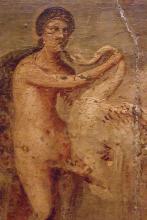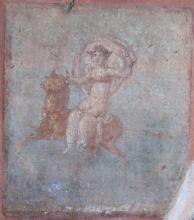Iūsta precor: quae mē nūper praedāta puella est
aut amet aut faciat cūr ego semper amem.
ā, nimium voluī: tantum patiātur amārī;
audierit nostrās tot Cytherēa precēs.
accipe, per longōs tibi quī dēserviat annōs;5
accipe, quī pūrā nōrit amāre fidē.
sī mē nōn veterum commendant magna parentum
nōmina, sī nostrī sanguinis auctor eques,
nec meus innumerīs renovātur campus arātrīs,
temperat et sūmptūs parcus uterque parēns:10
at Phoebus comitēsque novem vītisque repertor
hāc faciunt et mē quī tibi dōnat Amor
et nūllī cessūra fidēs, sine crīmine mōrēs,
nūdaque simplicitās purpureusque pudor.
nōn mihi mīlle placent, nōn sum dēsultor amōris:15
tū mihi, sī qua fidēs, cūra perennis eris;
tēcum, quōs dederint annōs mihi fīla sorōrum,
vīvere contingat tēque dolente morī.
tē mihi māteriem fēlīcem in carmina praebē:
prōvenient causā carmina digna suā.20
carmine nōmen habent exterrita cornibus Īō
et quam flūmineā lūsit adulter ave
quaeque super pontum simulātō vecta iuvencō
virgineā tenuit cornua vāra manū.
nōs quoque per tōtum pariter cantābimur orbem25
iūnctaque semper erunt nōmina nostra tuīs.
notes
1.3: Just Give Me a Chance
The poem begins with a cry of unrequited love: the poet prays first that the girl will love him, or at least not reject him outright, but then even that second hope seems too presumptuous. [full essay]
1–2: praedāta ... est: Notice the return to the martial terminology; see Amōrēs 1.2, where Ovid refers to himself as the spoils (praeda, 19) of Cupid. aut faciat cūr ego semper amem: i.e., if she will not love him outright, let her at least give him reasons to keep on hoping. Amet and faciat are both jussive subjunctive (AG §439). Amem is subjunctive in an indirect question (AG §574).
3–4: tantum: "only, just." patiātur: understand puella as the subject of this jussive subjunctive verb. amārī: understand sē as the accusative subject of this infinitive. audierit: syncopated form of audīverit, probably future perfect (AG §181b); the clause functions almost as the apodosis of a condition: "if she would just allow herself to be loved, Venus will have heard my many prayers." nostrās: plural for singular. Cytherea = Venus; the Greek island of Cythera was sacred to Venus. Google Earth map.
5–6: per longōs ... annōs: for per + accusative as "throughout" a period of time, see OLD 7. quī dēserviat: the antecedent is an implied eum, i.e., accipe eum quī tibi dēserviat. The verb dēservīre, "to devote oneself," can take a dative; it presumably retains some of its original meaning of "be enslaved to." The relative clauses of characteristic here and in the next line put the emphasis on Ovid’s character. nōrit = nōverit, "knows how to."
7–8: eques: "equestrian," a member of the ordo equester; take as a predicate nominative with est understood. A family founded by a member of the equestrian order was highly respectable, but it had distinctly less prestige than a senatorial family.
9–10: campus: normally refers to an open field as a site of sport or warfare, but here it clearly refers to land under cultivation, an estate. temperat et: = et temperat; poets often postpone conjunctions slightly for metrical or stylistic reasons.
11–12: comitēs novem: the nine companions of Apollo are the Muses. vītisque repertor: the discoverer of the vine is Bacchus/Dionysus, god of wine and, here, a god of poetry. hāc faciunt: if this reading is right it means faciunt hāc ex parte, "act on this side," i.e., "are on my side." mē quī tibi dōnat Amor = Amor quī mē tibi dōnat, i.e., Amor is handing the poet over, as a slave; compare dēserviat (line 5).
13–14: fidēs … mōrēs … simplicitās … pudor: These four Roman virtues parallel the divinities of poetry mentioned above (Phoebus … comitēs novem ... vītis repertor … Amor) and are also subjects of hāc faciunt (12). cessūra: "that will yield to," "second to," (+dat.). sine crīmine: the basic meaning of crīmen, crīminis, n. is "charge, accusation." purpureus pudor: note the repetition of the pu- sound, perhaps suggestive of an embarrassed stammer; pudor is purple because it is modestly blushing.
15–16: mīlle: supply puellae. dēsultor: "circus rider" (performers in the Circus Maximus who would jump from horse to horse at full gallop). This imagery suggests the opposite of fidelity, one jumping from bed to bed. sī qua fidēs: understand est, i.e., "if there is any loyalty in the world" (qua can be indefinite, "anywhere" or "in any way").
17–18: quōs … annōs: annōs, the antecedent of quōs, has been attracted into the relative clause, but functions with vīvere as an accusative of duration of time. sorōrum: the three Parcae (the Fates), who spun and cut the threads of life. vivere contingat: "may it befall me to live," "may I be allowed to live"; optative subjunctive (AG §441).
19–20: tē mihi māteriem: adversative asyndeton: the complete absence of connecting words indicates an abrupt change of topic. Māteriem fēlīcem is a predicate accusative with tē: "Offer yourself as …" in carmina: "for songs"; in + acc. can mean "for the purpose of." causā carmina digna suā: "songs worthy of their inspiration"; dignus regularly takes an ablative (AG §418b).
21–22: carmine: "in poetry"; Ovid proceeds to give examples of women whose names live on through poems. habent: plural because there are three subjects: Io; the suppressed antecedent of quam in line 22 (Leda); and the suppressed antecedent of quaeque in line 23 (Europa). Īō: the daughter of Inachus, from Argos. Zeus fell in love with her, raped her, then changed her into a cow in an attempt to conceal his actions from Juno. Ovid elsewhere describes Io’s shock at seeing her horns reflected in water (Metamorphoses 1.640–641). quam = ea quam; the reference is to Leda, seduced by Zeus after he took the form of a flūmineā … ave. A painting from the temple of Isis at Pompeii (1st c. AD) uses horns as a graphic cue to identify Io. It shows her ultimate salvation in Egypt, where she was delivered from Hera and returned to human form. She arrives in Canopus on the shoulders of the river god Nile, welcomed by Isis. An erotic fresco from Pompeii shows a naked Leda attempting to embrace the swan.
23–24: quaeque = ea quae(que), "and she who"; the reference is to Europa, whom Zeus, transformed into a bull, carried off to Crete. A wall painting of rather humble quality from a house at Pompeii (IX.5.14) shows the popularity of Europa as a theme. She rides a diminutive bull across the sea, her clothing blowing in the wind.
25–26: pariter: "equally," i.e., just as much as Zeus and his mistresses; the word may also suggest that Ovid and Corinna will be remembered together. nostra: plural for singular, even though in the preceding line nos apparently = ego et tu.
vocabulary
nūper: (adv.) not long ago, lately
praedor -ārī: plunder, rob
Cytherēa -ae f.: Venus
dēserviō -servīre: to onself to, to be enslaved to (+dat.)5
pūrus -a -um: clean, pure, innocent
commendō -āre: commit, commend, recommend
innumerus -a -um: countless
renovō -āre: restore, refresh, renew
arātrum -ī n.: plough
temperō -āre: set bounds, control, regulate
parcus -a -um: thrifty, frugal
Phoebus -ī m.: Apollo
novem: (indecl.) nine
repertor -ōris m.: discoverer, inventor10
simplicitās -ātis f.: simplicity; lack of sophistication, ignorance
purpureus -a -um: purple
dēsultor -ōris m.: circus rider15
perennis -e: perennial
fīlum -ī n.: thread, string
māteriēs -eī f.: matter, material
prōveniō -venīre -vēnī -ventūrum: come forth; come about
20
exterritus -a -um: badly frightened
Īō: Io, the daughter of Inachus
flūmineus -a -um: of a river
lūdō lūdere lūsī lūsum: play
adulter -erī m.: adulterer
simulō -āre: pretend; produce, simulate, feign
iuvencus -ī m.: young bull, bullock
virgineus -a -um: maidenly, of a virgin
vārus -a -um: crooked, bent; diverse, different
cantō -āre: sing
25



